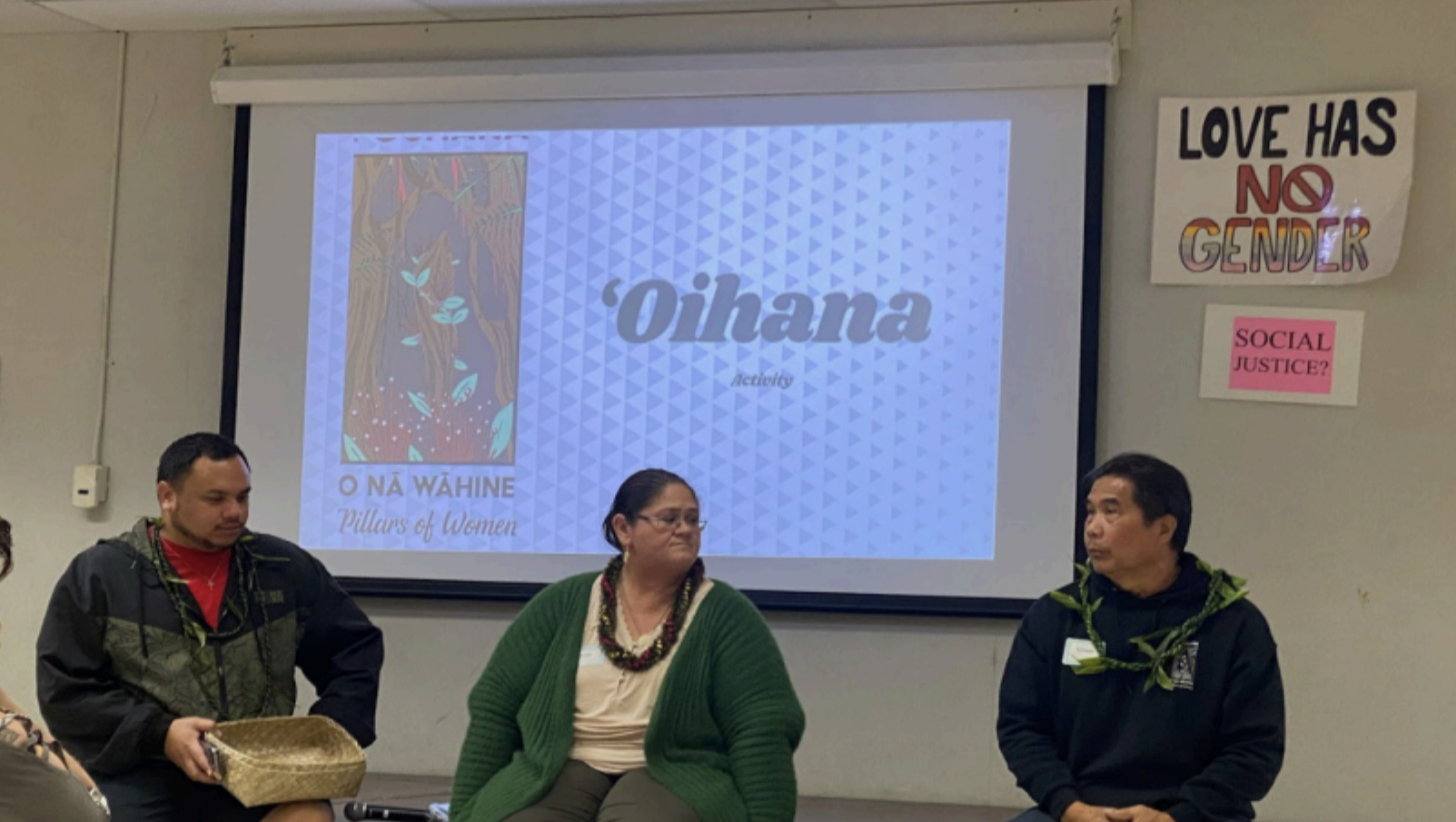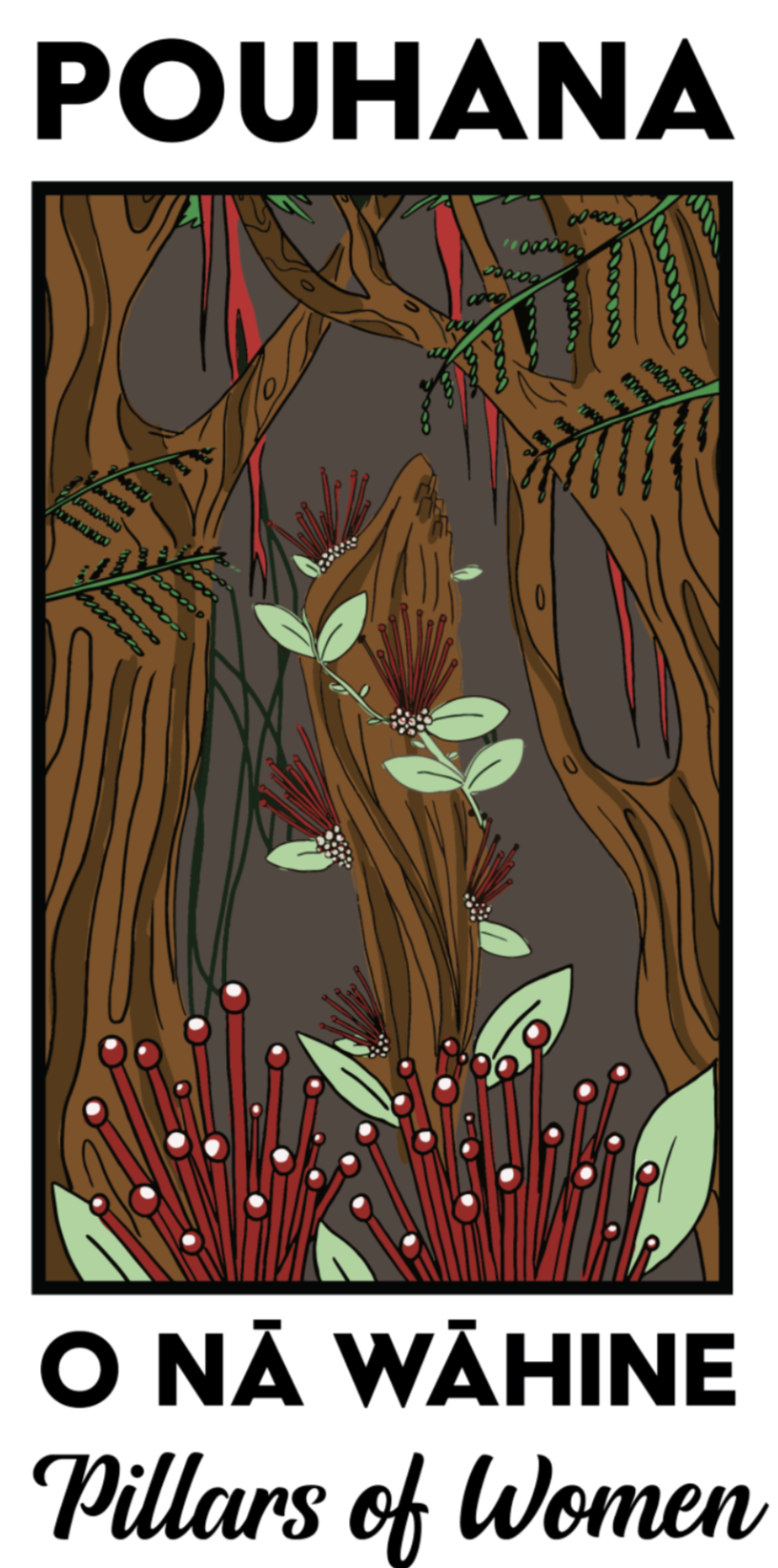Pouhana O Nā Wāhine: The Native Hawaiian Resource Center on Domestic Violence

In 2022, the Native Hawaiian Resource Center on Domestic Violence, Pouhana O Nā Wāhine (PONW), underwent a significant period of growth, emphasizing the development of our team's capabilities to address domestic violence effectively. This expansion exceeded numerical increases, symbolizing our collective dedication to instigating positive change within the Hawaiian community. Our commitment centered on nurturing diverse skills and perspectives and establishing a strong foundation for a more resilient and impactful team.
The strength of our team lies in its diverse composition, bringing together individuals with expertise in social work, policy, communications, traditional Hawaiian cultural practices, and healthcare. This diverse skill set enabled us to approach the issue of domestic violence from multiple angles, ensuring a comprehensive and culturally sensitive strategy. As a team, we pioneered Papa ‘Ōlelo, an Indigenous approach that seamlessly integrated insights from our diverse backgrounds, creating a powerful platform for survivors and service providers.
At the core of our efforts was the facilitation of "Conversations with Communities," where the richness of our team's backgrounds became evident in the inclusive dialogue we fostered. Acknowledging the importance of ”a holistic approach, we actively engaged with communities in Kahalu'u and Hilo, leveraging our diverse skill sets to tailor programs that addressed specific needs. Our technical instruction and facilitation of Native Hawaiian approaches reflected the depth of our team's expertise.
As a result, Pouhana O Nā Wāhine evolved into a trusted resource, frequently called upon in moments demanding change when violence occurred in Hawai'i. Our growth and collaborative efforts, rooted in the diversity of our team, showcase a powerful model for building capacity and effecting positive change in addressing domestic violence within the unique Hawaiian context.
In the initial year, PONW received grant objectives that included the creation of a curriculum for designated communities, with Hilo in east Hawaii Island being a primary focus. Recognizing the significance of pilina, or relationships, in Hawai'i, we established a valuable connection with Renee Rivera, a professor at Hawaii Community College specializing in Human Services and the Executive Director of “He Hoʻomaka Hou Ana O Puna,” a non-profit serving underrepresented women in rural Puna. Renee's existing connections with community navigators in Hilo proved invaluable, and her generous contribution of cooking traditional Hawaiian foods enhanced the success of our events.
Renee's promise of ʻai pono, or nourishing healthy Hawaiian cultural foods, became a powerful incentive for the community to participate. At each gathering, the shared meal created a sense of peace and contentment for many women who hadn't experienced such feelings in a while. Renee's support was instrumental in the success of the Hilo Curriculum building, and we extend our sincere gratitude to her.
Another key contributor to our curriculum-building success is Lahela Kruse, a formidable figure working on the ground level with those rehabilitating from substance use. Lahela, a trusted figure in the community, provided valuable insights during the curriculum development process. Her advice to keep it simple and culturally grounded, drawing on the principles of “kaulana mahina”, the moon phases, significantly influenced the creation of the Kumu Kukui, the candlenut tree, model guiding the curriculum's development. Pouhana O Nā Wāhine is grateful for the strong relationship shared with Lahela Kruse.
The “Conversation with Communities”, a facilitation tool developed by NIWRC for organizing national dialogue related to the domestic violence movement, was adapted and transformed by Pouhana O Nā Wāhine into Papa ‘Ōlelo. This Indigenous approach, incorporating Native Hawaiian beliefs, values, and cultural practices, proved essential in gaining insight, knowledge, and understanding of the concerns and needs of victims and survivors of domestic violence within specific communities.
The pilina (connections/relationships) and aloha with these communities also paved the way for Pouhana O Nā Wāhine to implement community curriculum development, further strengthening our commitment to fostering positive change in addressing domestic violence within the Native Hawaiian context by hearing and centering Native Hawaiian solutions and voices—individually and collectively.

Pouhana O Nā Wāhine's journey in 2022 exemplifies the power of collaboration, diversity, and cultural sensitivity in addressing domestic violence within the unique context of the Hawaiian community. Our team's remarkable growth and development underscore our commitment to fostering positive change, and our success in becoming a trusted resource reflects the impact of our collective efforts.
As we move forward, Pouhana O Nā Wāhine remains dedicated to pursuing innovative and culturally informed approaches to combat domestic violence. Our experiences in Hilo and Kahalu'u demonstrate the effectiveness of building strong connections with the community, grounded in the principles of pilinahā and aloha. These relationships facilitate the development of tailored programs and create a supportive environment for survivors.
The adaptation of “Conversation with Communities” into Papa ‘Ōlelo signifies our commitment to Indigenous methodologies, ensuring that our strategies align with Native Hawaiian beliefs and values. The Papa ‘Ōlelo approach, rooted in diverse perspectives and cultural practices, continues to be instrumental in understanding and addressing the unique challenges faced by victims and survivors of domestic violence.
As we express our gratitude to individuals like Renee Rivera and Lahela Kruse, whose unwavering support and expertise have played pivotal roles in our success, we also acknowledge the broader community that stands with us in the fight against domestic violence. The shared meals, conversations, and collaborative efforts have created a sense of unity and purpose that will propel Pouhana O Nā Wāhine forward.
In the years to come, Pouhana O Nā Wāhine envisions a Hawai'i where domestic violence is met with a comprehensive and culturally sensitive response. We commit ourselves to continue learning, adapting, and evolving our approaches to better serve the needs of our community. Through the strength of diversity, the power of relationships, and the richness of cultural practices, Pouhana O Nā Wāhine remains steadfast in its mission to effect positive change and create a safer, more supportive environment for all. Together, we can heal!
‘Ōlelo No'eau/Native Hawaiian proverb: “He kehau ho’oma’ema’e ke aloha”. O.N. #683 Love is like a cleansing dew…the cleansing power of aloha can soothe and heal; hurt, pain, and suffering yield to the healing power of aloha.”
For more information on the Pouhana O Nā Wāhine (PONW), go to: www.pouhanaonw.org





